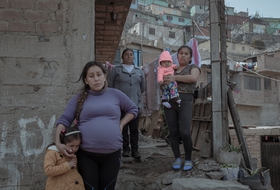
One in three women have suffered physical or sexual violence. With contributions from Europe, Africa, Asia and Latin America, we look at how this shadow pandemic affects every corner of the world.
Tarwi is a legume that has been rediscovered. Thanks to a cooperation project, it will improve the living conditions of the inhabitants of the remote Peruvian province of Huaylas.
The cultivation of an ancient variety of legumes will help 400 families improve their social and economic conditions, and strengthen women’s role in family life.
It is the tarwi, a legume grown in the Andean region of South America, well-known in the pre-Hispanic period thanks to its proteins, amino acids, and fats. Rich in proteins, it is an extraordinary food from a nutritional point of view, and today is protagonist of one of Peru’s most isolated communities.
“It is a community that mainly lives on agriculture, at 1,700 to 3,400 metres of altitude, which means it is really isolated,” explains Idoia Ortiz, desk officer for Latin America and Caribbean at Fondazione L’Albero della Vita, organisation working in Peru since 2007 with educational, health, and sustainable development projects. “Here, the population is affected by high levels of child malnutrition and has already abandoned agricultural good practices, resulting in less fertile soils. It is a territory difficult to be reached to provide aids and machinery”.
In this context, there is the project “Mujeres Andinas en cammino – Donne andine in cammino”, aimed to promote rural development of the Peruvian region. It is a project providing agricultural and ecological training that allowed 120 women benefitting from the aids and launching their role in the family income.
Tarwi cultivation on the one hand helps in the daily nutrition being a food containing 41-51% of proteins, 28.2% of carbohydrates, 7.1% of fibres, 15% of calcium, and 10% of iron. On the other hand, it increases the incomes of families living on 30 euros per month.
This legume, thanks to the agreements with Anpe (Organic Farmers National Association of Peru), will obtain the certification of agro-ecological product that will allow farmers selling it in the main regional and national markets and fairs, until Lima, the capital. There’s more. The aim is reaching international markets. Furthermore, thanks to the collaboration with Slow Food, the tarwi will be given the possibility to become a Slow Food Presidium, in oder to protect its excellence and small-scale production, by promoting its trade on an international level. Incomes deriving from this new market will help Quechua communities in the province of Huayalas fight poverty and subsistence economy.
Siamo anche su WhatsApp. Segui il canale ufficiale LifeGate per restare aggiornata, aggiornato sulle ultime notizie e sulle nostre attività.
![]()
Quest'opera è distribuita con Licenza Creative Commons Attribuzione - Non commerciale - Non opere derivate 4.0 Internazionale.
One in three women have suffered physical or sexual violence. With contributions from Europe, Africa, Asia and Latin America, we look at how this shadow pandemic affects every corner of the world.
The Istanbul Convention against gender-based and domestic violence marks its tenth anniversary. We look at what it is, who its signatories are, and what the future might hold.
European Commission President Ursula von der Leyen reminded us of the gravity of violence against women around the world, and of the Istanbul Convention’s utmost importance.
President Erdoğan has pulled Turkey out of the Istanbul Convention, key in the fight against gender violence, claiming that it favours the LGBT community rather than family values.
Violence against women in Peru has increased as a result of Covid-19 lockdowns. 14,912 people were reported missing from January to November 2020, more than half of them minors and 64 per cent women. People have been confined to their homes for months, many forced to endure poor physical, economic and social conditions. A situation that
Joys Estefani Qqueccaño Huamani, 24, disappeared from her rural community in Peru on 9 October. Her family began looking for her independently of the authorities and despite the resistance of relatives of Joys Estefani’s ex-partner Arturo Ccana Condori, 32, charged with committing violence against her on 28 September, eleven days before Joys Estefani disappeared. Photos
Costa Rica celebrated its first same-sex marriage when two women, Alexandra Quiros and Dunia Araya, celebrated their wedding: an “extraordinary moment”.
The pandemic and its restrictions are affecting everyone, without exceptions. However factors like housing, income inequalities, gender, access to technology and working conditions are influencing how people experience the health crisis.
Time magazine’s 100 Women of the Year project sheds light on influential women’s stories, from Amelia Earhart to Greta Thunberg. A selection of some of the greats for International Women’s Day.







